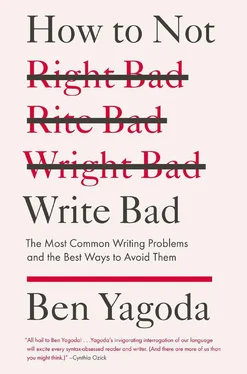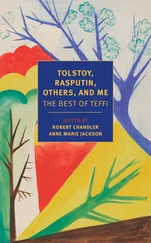Pallet:a small platform usually made of wood. Past:referring to former times. Passed:past tense of pass. On a related point, baseball is the national pastime, not the national pasttime. Principal:Noun = the head of a school or a key participant in an enterprise. Adjective = first or among the first in importance. Principle:Noun = a basic assumption or ethical standard. There:used to indicate a place or pronoun used (with is or are ) to begin a clause. Their:possessive of they .
They’re:contraction of they are. Through:preposition indicating movement from one side of something to another. Threw:past tense of throw. Waive:Verb = dispense with or put aside, as with a requirement or rule. Wave:Noun = that in which water, air, or light travels. Verb = move around in the air. Who’s:contraction of who is. Whose:preposition denoting ownership or association. Your:possessive of you. You’re:contraction of you are.
b. The Blind Spot, Yet Again
In a particularly sloppy sort of spell-check error, the writer knows very well that he or she has typed the wrong word — or would know if he or she took even a couple of seconds to look over the sentence. The words have completely different meanings and don’t sound exactly or sometimes even vaguely alike: thought instead of though, for example, on instead of one, or weird instead if wired. But the writer has come to rely on the squiggly red line, and the squiggly red line is no help. Some of these mistakes have become so common that I think the writers don’t actually realize they’re wrong. For example:
Advise (verb) instead of advice (noun).
Breathe (verb) instead of breath (noun).
Loose (adjective) instead of lose (verb).
Mixing up quiet and quite and than and then.
Where instead of were.
And sometimes these substitutions can have a certain poetic rightness to them. The student who wrote, “The eminent [instead of imminent ] arrival of spring marks a time for flip-flops, volleyball, and compost,” and the one who said, “People will say we are America and we can not let our hollowed [instead of hallowed ] education system be mocked,” after the Virginia Tech shootings, made felicitous plays on words that may even have been intentional (probably not). Yet another student wrote, “In 1996, former President Bill Clinton singed the Defense of Marriage Act.” No comment.
Most of the time, however, the only redeeming social value these errors have is that they’re funny. You may be laughing to keep from howling with despair, but at least you’re laughing. I once got an assignment with the line “You can get a descent car for $2000,” which seems about right for a vehicle that can only go downhill. This nicely complemented another essay with the sentence “The narrative voice was undeniably a black man in his late thirties or early forties, educated, and possibly of middle-class decent.”
And these guys can get the New Yorker —heading — treatment as well.
I KNEW THE CRIMINALS WERE GETTING YOUNGER, BUT THIS IS RIDICULOUS
…the 199-unit low-income housing district is a teething hotbed for drug deals and violent crime …
CLINT ALWAYS SEEMED PRETTY NORMAL TO ME
At 74 years odd, a weathered, contemplative Eastwood portrays this inner-struggle perfectly, naturally.
I WENT TO A FIGHT AND A CITY COUNCIL MEETING BROKE OUT
The opening of the meeting was similar to past meetings with mediation and the Pledge of Allegiance.
Try it yourself, it’s fun!
[PUT YOUR HEADING HERE]
Her gentile nature shines through her songs, which focus on love, growing up, and moving on.
Truth to tell, I don’t always know if the people who make these mistakes are aware that they’re mistakes. I do know that relying on spell-check and your instincts creates a huge blind spot as far as spelling is concerned.
c. Eggcorns
In 2003, linguist Geoffrey Pullum coined the term eggcorn to refer to common homophone or near-homophone mistakes in which the mistake makes a kind of sense. Eggcorn itself has a certain logic, for example, because acorns are roughly the shape of eggs. In writing and usage circles, the term caught on, and you can go to the Eggcorn Database (http://eggcorns.lascribe.net/), where, as of this writing, 631 examples are collected and defined.
Spell-check has ushered in a golden age of eggcorns, and people can be quite creative and individualistic with them. In the Introduction, I mentioned the article I once got about a board-of-education meeting that mentioned the Super Attendant of Schools and the one on drug problems that referred to a heroine attic. Others have made reference to the environmental group the National Autobahn Society , to Linda B. Johnson, to an ex — Green Barrette, and to the punk rocker Sid Viscous . I always thought he was an oily guy.
Sometimes you have to think before you realize what was meant, as in references to a newspaper’s ethics policy being determined by its On-Buzz Man (the real word is ombudsman ) and to the writer’s fondness for going out on the town wearing a sequence-covered dress. Only after searching for context clues and employing the process of elimination did I realize that that a supped up hers was supposed to be souped-up hearse.
I once got an assignment that talked about a student athlete who had to miss several games because of phenomena. I stared at that one for a few minutes before realizing it was supposed to be, that’s right, pneumonia. The error illustrates another spell-check problem. What probably happened is that the student took a wild stab at the spelling of the disease and then perused spell-check’s suggestions. Maybe the stab was so wild that the correct spelling wasn’t on the list; maybe it was and the student didn’t recognize it. Who knows. The end result, in any case, was phenomena.
One hears a lot of these in conversation, most famously for all intensive intents and purposes and Old Timer’s Alzheimer’s disease. Some of the others I’ve come upon and treasured include It’s a doggy-dog dog-eat-dog world and Any notes, quotes, or antidotes anecdotes?
Some eggcorns come up so often that they now outnumber correct usages, at least in the work handed in to me. I actually expect to read that something peaks or peeks (rather than piques ) the interest; that a person poured (rather than pored ) over a book; or that a storm wrecked or reeked (as opposed to wreaked ) havoc. Other popular ones are hone in on (as opposed to home in on ); dribble ( drivel ); a mute (as opposed to moot ) point ; and take the reigns ( reins ).
Listing the eggcorns and all the other spelling mistakes is well and good, but the trouble is, if you’re about to commit one, by definition, you don’t know you’re doing so. That’s the blind spot again. The answer, again, is to cultivate an attitude of deep skepticism about your own word use. Then, if you have any smidgen of doubt about a word, DO NOT RELY ON SPELL–CHECK. Use a dictionary, preferably a paper one, and look up not only the spelling but the definition.
Читать дальше












